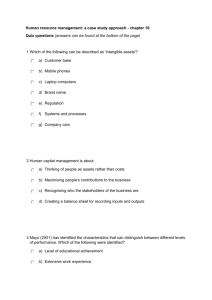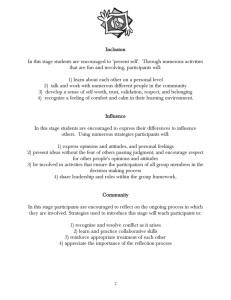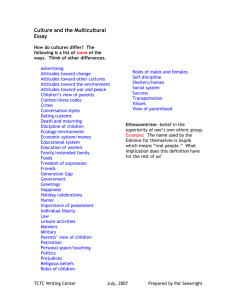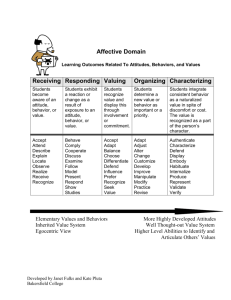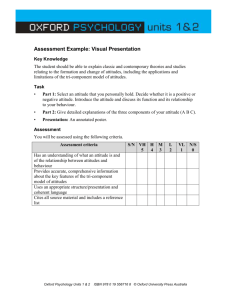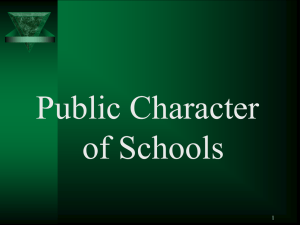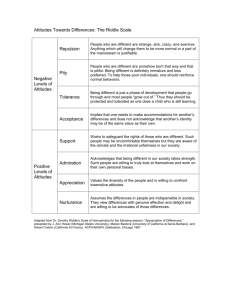Public Opinion Lecture #5
advertisement
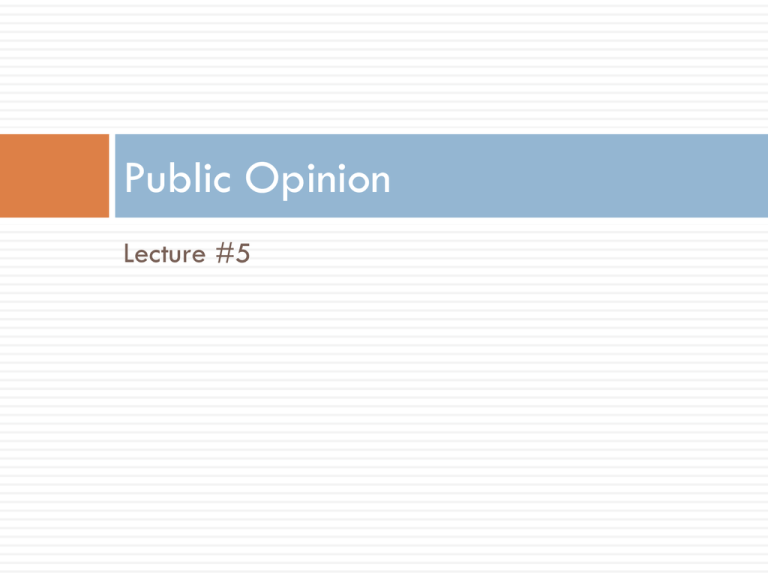
Public Opinion Lecture #5 In Class Assignment #2 Name 5 things that influence a fashion brand’s public opinion Public Opinion Suffering a loss of public opinion is not a small issue No individual or organization can suffer to tarnish their reputation A negative public opinion can result in a loss of prestige and/or business The way customers, vendors, suppliers, retailers, the media, and the community perceive the brand has an effect on the organization In most cases this leads to a loss of $$$$ Public Opinion Public- a group of individuals who share a common interest in a specific subject Opinion- the expression of an attitude on a particular topic, when attitudes become strong enough they surface as an opinion, when opinions become strong enough they lead to verbal or behavioral actions Attitudes Opinions Actions Public Opinion- the compilation of many individual opinions on a particular issue that affects a group– a consensus Public Opinion The best PR campaigns in the world cannot be built if reality is destroying it It is difficult to change individuals’ minds. It is even harder to move them away once they have formed an opinion Most PR programs are meant to Persuade individuals to change their minds Crystallize uninformed or undeveloped opinions Reinforce existing opinions What is an Attitude? We all have one, but what are they? Attitudes are evaluations that we make about specific problems or issues They are positive, negative, or nonexistent; for something, against something, or neutral Attitudes and behaviors are both situational-influenced by specific issues in specific situations When others with similar attitudes reach similar opinions, public opinion is born How Are Attitudes Developed? Personal- physical and emotional; size, age, social status Cultural- Rural and Urban, North and South Educational- an individual’s level of education alters their attitude about specific issues or events Familial- we acquire our parents’ tastes, biases, and political views Religion- allows us to form attitudes about specific topics Social Class- when status changes, so does attitude Race Friends Celebrities and Community Leaders The Product Changing Attitudes It is very hard to change the minds of individuals who strongly support or oppose an issue or individual This is why those in the middle, or who remain neutral to an issue or individual are important to shaping public opinion. Those in the middle are usually the easiest to sway one way or another, because typically these individuals are passive or indifferent. Changing Attitudes Cognitive dissonance- the idea that individuals avoid information that is dissonant or opposes their own points of view, and they tend to seek out information that supports their attitudes Social Judgment- individuals may have a range of opinions on a certain subject, anchored by a clear attitude While it is hard to change individuals’ positions, communicators can work to modify an individual’s opinion Motivating Attitude Change Motivation is key to changing anyone’s attitude from latent to aware and finally active Maslow’s Hierarchy of Needs helps us understand what motivates us: Psychological Needs- food, water, sleep Safety Needs- security, protection Love Needs- love, belonging, affection Esteem Needs- recognition and prestige Self-Actualization- becoming what is capable of becoming According to Maslow, all 5 lead to motivation Power of Persuasion Perhaps the most powerful tool for influencing public opinion is persuasion Persuasion- getting another person to do something through advice, reasoning, or arm-twisting A person may be in two minds in order to be persuaded to believe in a particular position or take a specific action. Systematic- an individual who has carefully considered an argument Heuristic- an individual who has skimmed the surface and not really focusing on the intricacies of a particular position Power of Persuasion Everyone is persuaded by different things, making it difficult for PR professionals to persuade individuals People understand things in terms of their own experience If you want to persuade someone, you must cite evidence that coincides with their own beliefs, emotions, and expectations Types of Evidence Facts- indisputable, a good PR professional always starts with research Emotions- people respond to emotional appeal Personalizing- people respond to personal experience Appealing to “you”- what is in it for me? It is always important to think in terms of what will appeal to the audience when trying to persuade Influencing Public Opinion Public opinion is a lot easier to measure than it is to influence The opinions being changed of modified must be identified and understood Target publics must be clear PR professional must have a sharp focus of the “laws” that govern public opinion Influencing Public Opinion Highly sensitive to important events Generally determined by events more than words In critical times, individuals become more sensitive to the adequacy of their leadership– if they have confidence in it they are willing to assign more responsibility, if they lack confidence, they are less tolerant Once self-interest is involved, opinions are hard to change People have more opinions and are able to form opinions on goals more easily than on methods of reaching goals Image and Public Opinion Organizations and individuals in the spotlight must understand that credibility is crucial to gaining public support. In order to earn and keep that support, they must operate with the trust of the public in mind Those concerned with public opinion are focused on managing their reputation Image and Public Opinion Reputation is based on what one does, not on what one says and is present throughout our lives. Many PR firms have introduced reputation management divisions, and have even called themselves reputations managers Relationship management aligns communications with an organization or individual’s character and actions Create recognition, credibility, and trust among constituents Managing reputation is a front-line responsibility of public relations Image and Public Relations There is the image that the brand tries to build There is the image that the media portrays of the brand The image the society itself thrusts upon the brand Together they all shape the composite of the brand In fashion, PR is usually responsible for shaping public opinion through unpaid media exposure opportunities The Media and Public Opinion PR aims to control the image projected in the media and community What the media says about the company and what the community thinks are both concerns of the PR professional It is important that an organization obtains a favorably public opinion because when a consumer has to decide between an organization and its competitor, the consumer usually goes with the company who has the best public opinion Public Opinion and the Organization Public opinion is responsible for the success and failure of an organization or individual. It can directly or subliminally affect the buying habits of the organization’s potential consumers. Because individuals have different attitudes toward issues it makes the task of managing public opinion difficult for the PR professional Public Opinion and the Organization If your organization sells furs and leathers, you may offend a group that does not support animal products. You may also alienate the group that desires the products if you do not carry these products Similarly, if word gets out that your organization uses sweatshop conditions in it manufacturing processes, the attitudes of your consumers may range from being deeply upset to not caring much at all. This shows how PR professionals struggle to appeal to its consumers, while also remaining ethical Public Relations Shaping Image If you do not have a public image, the public will be happy to create on for you. No image = Bad Image When advertising and promotional efforts are properly used with PR, organizations can proactively shape public opinion of a brand. Products that uphold the promises that are made to consumers help shape a positive image. Media and Shaping Image Must take a proactive approach to soliciting media coverage. Must conduct research Must build relationships- have the right contacts for the right story Send story ideas to media personnel that cover topics related to your idea Keep the ideas newsworthy, concise, and follow up after the press release is sent Working with the media is the only way they will help shape your organization’s opinion Shaping Image by Word of Mouth Create a buzz- individuals pay attention to the buzz When you combine communications, with press releases, community activities, and marketing with the objective of getting the word out about the brand, you create excitement in the community about the brand. These activities give life to the brand. Getting involved in the community and events is a great way to start the buzz and ensure success of a word-ofmouth campaign. Shaping Image With Ethics Unethical behavior of an organizations will most likely have negative repercussions. Developing ethical standards and adhering to those standards can help positively shape the image of an organization and its brands. Final Thoughts Public opinion is a series of developing attitudes and opinions into behaviors There are a series of elements that help individuals shape their attitudes Community, media, word of mouth, vendors, suppliers, consumers, and employee all help or hurt public opinion. Once your organization has a negative public opinion it is difficult to change. You can create a positive public opinion by acting ethically, being honest, delivering quality products, and remaining credible. References Seitel, F.P. (2011). The Practice of Public Relations. Prentice Hall: Boston. Sherman, G.J., & Perlman, S.S. (2010). Fashion Public Relations. Fairchild Books: New York.

